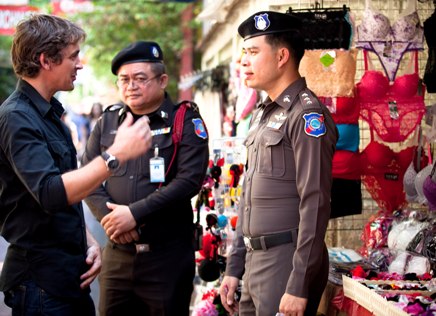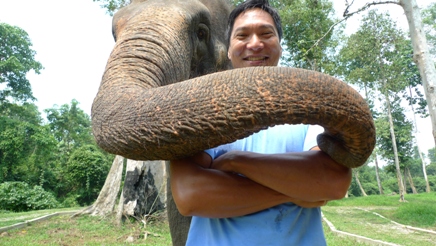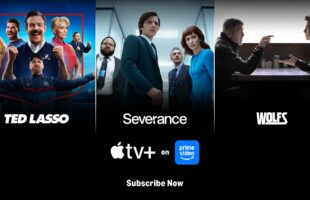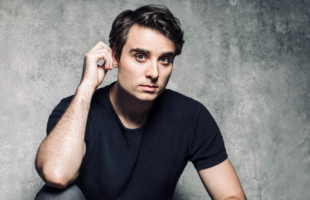
 Q: Tell us about your role in the Hong Kong office?
Q: Tell us about your role in the Hong Kong office?
A: National Geographic Channel (NGC) wanted to make changes to its programming and overall channel strategies. As part of that, they needed a head of production to increase local production across all our 14 territories, all with the aim of driving ratings and deepening relevance. I’m kind of an ambassador for local production on NGC across our 14 territories. We work very closely in the company because we have a lot of offices and teams. These countries not only run the factual channel but the entertainment and movie channel and sports as well. I work pretty much hand in hand with them, supervising them and consulting – It’s more a consultation process where we are taught with identifying what we should be producing locally. Sometimes I get very hands-on involved in executively producing the project. Other times, I’m playing more of the consultant role depending on which market. Some markets (Taiwan and India) we do have already quite a stable tradition of producing factual shows out of their market for their market.
Q: What about the UK production hub that has been set up? How are the decisions made in Hong Kong then connected to that?
A: Well, obviously, NGCI has moved some of its international functioning to London which used to be based in Washington, D.C. They are, I guess, a central coordinating hub that is looking to produce international content but we decentralise our commissioning. If I look at the changes since I’ve come in to before, I would say NGC was commissioning things more from a distance prior to my arrival and that’s one of my reasons for me to come here, that we take more independence on our own within Asia Pacific and start commissioning more of our own projects. There are opportunities to share things with NGCI internationally, but we just needed more initiative drive and focus within our own region. So, hence there was a need to do that.
Q: NGC as a whole seems to be moving away from one-offs and going into series, particularly those that are returnable, and series that are personality-driven. Is that the same for Asian commissions?
A: Yes, definitely. I think everybody wants returnable series because there’s a lot of value in them but obviously our strategy is in line with that as well within Asia. We will do certain specials or one-offs if it’s a very strong story or if it’s very topical or if it’s a major anniversary. Those two sort of have a space in the shadow but I think what we’re saying is we’ve got to prioritise developing returnable series because that’s how production can make a more significant contribution to channel performance. If you have a hit series, if you can identify it’s a good series, then obviously people keep coming back and over the course of several months; you get a big, sustained boost to your ratings. With a special or one-off, it’s not that we won’t do them but we recognise the value of that is still nowhere near compared to what a series can give you.
Q: Some series like Strippers: Cars for Cash, Doomsday Preppers and Family Guns seem to be “lighter”. Are you concerned about that?
A: Not concerned about that and I do think it’s becoming lighter, although I don’t know if lighter is accurate. It’s lighter compared to the traditional perception of what National Geographic is, but everything has to change and grow and keep up with programming trends. I don’t think it is true to say that if we become more fun, it doesn’t stay true to what National Geographic is about. It’s still about exploration in many senses of the word. It’s just that not every show is going to be a Great Migrations-type of special. We can’t fill the schedule with the Titanic anniversary all the time.
Q: How has the Asian output changed since you joined?
A: There’s a significant increase in what we’re trying to do. In factual alone, we’re probably looking in the region of 100 hours a year. If you look at what we’ve been doing the in 2011, for instance, we really wanted to grow our success on all levels; on a local level, regional level and a global level. In August 2012, I got a rating report that said we beat our number one competitor in various Asian territories which made us the number one factual channel in August. So obviously a lot of these new international programmes are working. A lot of our regional and local programming stunts have been working and on a purely local level, what we do in local productions is also playing a part. So if you look at it, it’s sort of three-pronged, with the most important prong being the local one. I also think local is where we could discover the next pan-regional hit idea, format or even on-camera talent.
Q: Tell us about some successful titles that have done well for NGC.
A: Dog Whisperer was a big win for us. We have, internationally, worked on a new title with him which is a spin on Dog Whisperer called Leader of the Pack. That’s quite a milestone for NGC programming. Something like Dog Whisperer, again, may not be associated with the traditional NGC but it demonstrated to us again the power of a hit series. Therefore we want to try and replicate locally as well. Not to have our own Dog Whisperer but to have our own strong local and regional series.
Q: How about the Bruce Lee special that aired earlier in 2012?
A: We did what is our first, sort of, significant regional programming initiative with Bruce Lee: The Legend. The reason behind that was we took an iconic hero and packaged a whole bunch of shows together and positioned it to appeal to the Bruce Lee in all of us. So that on a regional level again is an example of how we’re finding more ways of making our channel more relatable to our viewers. We’ve also got a series called Scam City which goes around to different major cities to identify how people typically get conned. Even within that international series there’s episodes on Asian cities as well. So we’re constantly looking for ways where we up the Asian factor and really start to be more international in our content.
Scam City Bangkok
For local productions, in 2012 we’ve done quite a few specials; we did a Megastructures on Gardens by the Bay. Gardens by the Bay, for example, did 264% above average in Singapore. We did another special on the Philippines on the presidential palace where Noynoy Aquino lives. It was called Inside: Malacañang. That got 412% above average in the market. In Malaysia, we’ve delivered a show called Malaysian Journey with Jason Scott Lee. This is the second show that goes into the rainforests of Malaysia. That got around 2000% above average in Malaysia.
We’ve got other productions in the past where we’re trying to learn from and grow. I think one of the most dramatic success stories was Every Singaporean Son, which was a ratings winner in Singapore. There are plans to build on the success of Every Singaporean Son and certainly that model. I hope that gives you kind of a big picture and a small picture to see how our strategy is working globally, regionally and then locally through local productions. That’s pretty much the direction we’re going.
Q: Are you bringing Asian commissions to National Geographic channels globally?
A: It is not a main goal of mine but I would say that’s a bonus. They tend to be more specials (than series) though. Sometimes producers come in with an idea that’s from our region but international at the same time. They can come to me via Asia or they can come to international. Even though I said we don’t do global stuff, one of the main series I’ve been working on since I joined is Access 360Ëš World Heritage, a series about world heritage sites. It’s a partnership with UNESCO and Panasonic and that’s a global series. So it’s been driven out of Asia and will air in every NGC territory around the world.
Q: As we know there is now a trend towards personality-driven shows. When it comes to Asian commissions, which personalities have worked well for you or have you discovered new personalities that will be used to a greater extent in future Nat Geo productions?
A: It’s a really good question. I don’t know if I have an answer to that but I think for NGC, it’s well known, it’s no secret that internationally we have catching up to do in terms of looking for talents. On Nat Geo Wild we’ve got a lot of talents. In Asia, I haven’t really done, at least I haven’t personally done a lot of talent-driven stuff yet but I am definitely looking. As you know when it comes to the factual stage phase, we’re not looking for a generic presenter that looks and speaks well right? They normally come from some field of expertise. So a lot of presenters are, say, former chefs or currently are chefs or they’re foodies. Speaking of which, that is a genre that NGC hasn’t really explored yet, doesn’t mean we won’t but that’s an example of genre that will allow you to develop a lot of phases and talent. I have talent as one of the things on my checklist of commissioning.
Malaysian Journey with Jason Scott Lee
Q: So really, there’s no search for local version of Cesar Milan?
A: There’s no active search for it. We haven’t put an ad on the papers yet, so to speak. It may not make sense for us to clone all these shows necessarily. There are franchises that we’ll be doing a local version of and it makes perfect sense and then it works. For example Inside, which is a franchise that has been very successful. For us to do a local Dog Whisperer would be great if we could find that local Dog Whisperer. If it’s a cheap copy of Cesar Millan, it’s not going to play well.
One of the best things about talent-driven shows from a channel perspective is if the talent works, it’s impossible to copy. There is only one Cesar Millan. The last thing I want to do is trade something or someone who’s seen to be not quite as good as Cesar Millan. I’d rather come up with an articulation, potentially of the same idea, but based on that talent. My door is open; my email is known to most producers out there. If they have talent, I’m more than happy to look at what idea that talent could drive but I don’t think that taking something like Dog Whisperer and saying “go find me a replica of this guy that’s Asian” is necessarily going to add that much value.
Q: Lastly, where do you think the trend is heading when it comes to factual entertainment?
A: People like us to explore new subcultures and hidden worlds. If you were to do a series, you kind of need to find that subculture or hidden world with which you can get returning episodes, as opposed to an anthology where you have, say, an umbrella theme like Inside and every episode is slightly different. I think that trend sort of blends into this series approach which is largely character-driven. So like Cesar Milan in Dog Whisperer; every episode you get a different situation and a different dog. Doomsday Preppers as well; you get different characters, different situations. All of the major factual returnable series have that very strong character-led world whether they work in a business or a subculture, and it’s done in a much more contemporary factual entertainment way. That’s certainly what we’re looking at doing in Asia.










